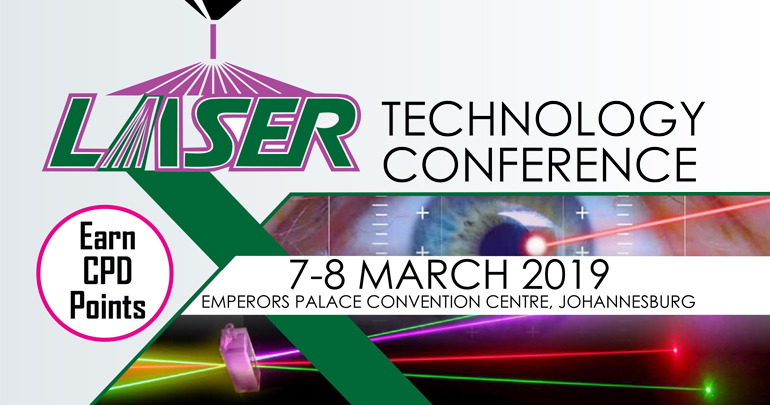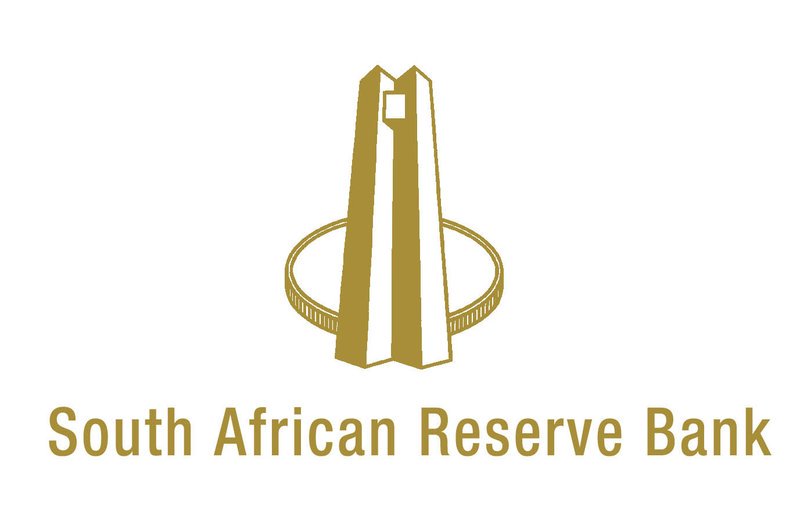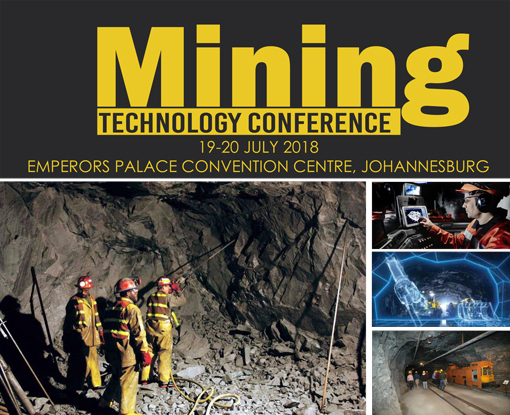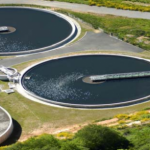
Nov
Laser Technology Conference
INNOVATIONS in technology are well known for setting changes and adding value to market structures. This is no exception to laser technology sector. The field of laser technology is in a constant state of further development with possible applications of lasers, such as in industrial manufacturing processes and tools for material processing through welding, cutting or engraving gaining momentum. There is no doubt that Laser innovations are set to open up revolutionary new technologies for medicine, communications, manufacturing, product development and more industries in South Africa.
Many innovations are exploring advance manufacturing technologies, leveraging on the strong global growth of the laser technology sector. The adoption of laser technology as a manufacturing technology is also currently gaining momentum.
Despite several innovative projects in the laser industry, market penetration, skills and capacity development still remain problematic. Various challenges such as lack of local content and proliferation of imports, limited collaboration between sectors, limited manufacturing capabilities in form of infrastructure and expertise still hinder the growth and adoption of the technology.
Topics to be discussed include; most recent innovations, trends, industry collaborations, concerns, standardisation, conversion and testing, regulations, skills and capacity development, practical challenges encountered and the solutions adopted in the fields of laser technology amongst other topics. This conference therefore seeks to bring together leading academic scientists, researchers, engineers and research scholars amongst other audiences to exchange and share their experiences and research results about all aspects of laser technology. The conference will also discuss the current trends in the field of laser technology. Moreover, delegates will be informed about applications and technologies that are here to stay and the opportunities that will arise from these developments. The conference will also provide a platform for discussion and networking as well as to share new ideas, advancements and research related to the application of laser technology in various fields and industries and its related topics.
This is must attend eventfor those who would like to gain the opportunity to consolidate their knowledge and understanding of the latest scientific advancements on laser technology and their applications.

Sep
Mental Health & Psychology Conference
There is no doubt that Mental health awareness has grown significantly over the last few years with a staggering 450 million people world-wide having varying degrees of mental health problems. This is despite Mental health being historically neglected on Africa’s health and development policy agenda. In South Africa alone, mental health issue has become a significant problem with about three in every 10 South Africans over 60 being in of need medication for mental health in the future. Currently, this is not only affecting the old age, but the young generation as well. Institutions such as universities have not been spared on this growing crisis. Mental health illnesses are said to be costing the country over R2 billion with over 17 million South Africans said to be currently dealing with various forms of anxiety disorders.That is the alarming stage that mental health illnesses have reached in the country.
Lack of mental healthcare in the country has gotten a lot of stakeholders in the industry worried. This include the shortage of health personnel such as psychiatrists. The World Health Organisation (WHO) Global Health Observatory data estimates that there is one psychiatrist per 100‚000 South Africans and fewer in the public health sector.
According to Professor Felix Potocnik from the South African Society of Psychiatrists (Sasop), only one psychogeriatric in Bellville remains at the South African Universities out of the five previously dedicated psychogeriatric units with an extensive waiting list. Various initiatives are said to be falling through the cracks due to the overburdened healthcare system.
Misconceptions about mental health issues – not just in South Africa, but globally has often resulted in people not receiving the correct diagnosis or treatment. Considering that an international survey revealed that one in three people will be affected by mental illness in their lifetime and mental disorders have increased by 22.7%, It is therefore not surprising that it has become a focus amongst healthcare providers as well.
Interventions, engagements and dialogue between the different stakeholders from government, to non-governmental organisations to community based healthcare providers is therefore required to tackle this crisis.
This one day conference will bring together stakeholders in the mental health and psychology industry to deliberate and evaluate what interventions can be done to sustain this crisis. It will also identify the challenges facing the mental healthcare industry, assess the shortage of mental health professionals, mental health in the workplace, as well as evaluating the different approaches to addressing mental health issues amongst other topics.

Aug
Cashless Payments Summit 2018
The Cashless Payments Summit returns for its third edition at the Emperors Palace Convention Centre in Johannesburg, and the focus this year will be on Vision 2025, financial inclusion, blockchain technologies and where South Africa and the Southern Africa Region stand with regards to latest developments in payments innovation.
With the ever-rising costs and dangers of handling cash, as testified by the recent and ongoing cases cash-in-transit robberies, there has never been a better time to explore smarter payment systems that are way safer than using cash when settling transactions. Yet, even as the finance industry pursues these innovations in payments, there needs to be a comprehensive education drive among consumers for whose benefit these systems have been designed. Just as banking and financial transactions have gone digital, so have cyber criminals followed the money onto cyberspace, where they prey on organisations and individuals with lax cyber security systems.
There is therefore need for consumers to be thoroughly versed on the latest payments systems, to equip them with knowledges on the processes and intricacies on these latest payment technologies and how to conduct them in a safe and secure manner. The 2018 edition of the Cashless Payments Summit, to be held on the 18th and 19th of October at the Emperors Palace Convention Centre in Johannesburg will address these questions, as well as explore the various ways in which cashless payment systems have improved customer experience in settling transactions.
The event will also look at the efforts being made by some organisations to include everyone in the latest financial status quo, the central bank’s vision for a revamp of all payment systems to world-class status by 2025. All the leaders in leaders in payments innovations will be there, to shape the future of payments in the region.
Speakers










Jul
Cybercrime And Insurance Conference 2018
The Cybercrime and Insurance Conference 2018 is back for its third annual show in Johannesburg, and this year the focus will be on how organisations and governments handle people’s personal data that they keep on their servers. Following the outcry against Facebook and Cambridge Analytica, who were complicit in selling the personal data of millions of users it gathered to third parties prior to the 2016 presidential election in the USA, there has been widespread discussions about how people’s personal data should be handled.
Lax data security policies and laws have resulted in tragic consequences for many consumers of internet services. There are countless examples of individuals and organisations who have lost identities, finances and valuable data to cyber criminals; more so in developing worlds like Africa, where the majority of the populations is not internet-savvy. A report by security firm McAfee and the Center for Strategic and International Studies has revealed that the global cost of cyber-crime is $600billion. In South Africa, better light needs to be shed on regulation that deal with cybercrime and security, like the POPI Act, and what organisations need to do to ensure compliance, to prevent further loss of income and intellectual property.
In this Information Age, Africa is joining the world in integrating connected systems across its public and private operations; yet in most cases security measures have not been implemented as fast the technology they are supposed to be watching over. As a result, threats to networks, devices, programmes and data from the ever-evolving cyber attackers are now a growing risk across public and private organisations. And some of the reasons why cybercrime is becoming so widespread locally is because there is little acknowledgment of the extent to which it hurts businesses, and also because the skills needed to thwart the attacks are in severely short supply. Given the prospect of financial loss, disruption or reputational damage involved, ensuring security in cyberspace has thus developed into such importance that it has been included into the corporate governance strategies of some organisations.
This year’s conference will delve into cybercrime as a national security threat; discuss how mobile gadgets are being targeted for attack, as well as assess how the general risk of cyber threats can be quantified into insurable amounts, among many other issues. Set to take place on the 6th and 7th of September 2018, at the Emperors Palace Convention Centre in Johannesburg, the Cybercrime and Insurance Conference 2018 is a must attend to all those who care about their clients’ and organisations’ internet security in the Information Age. Key figures from government agencies, cyber specialists and related industry will meet to establish a cross-sector response to cyber risk and data protection.

May
For a country like South Africa, the issue of conserving water has long since moved from choice to necessity – the country simply cannot afford to let any of its fresh water go to waste. Three years’ worth of drought has depleted water levels in the Western Cape – to the point that the City of Cape Town is counting down days until it turns off supply to household taps for its inhabitants, and starts rationing water from communal sources.
Water supply is literally a case of life and death, and it would be a real shame if we were to run out of it. But the days might be coming when we will lose this precious resource, if we are not careful with our use of water. The situation in Cape Town has taught us that water is a finite resource that should be prudently utilised and saved at all costs. With the growth of population, the demand for water has correspondingly increased; the Food and Agriculture organisation (FAO) reports that global water withdrawal increased from less than 600 km3/year in 1900 to almost 4,000 km3/year in 2010. According to the Organisation for Economic Cooperation and Development (OECD), global demand for water is projected to increase by 55 percent between 2000 and 2050, mainly driven by a 400 percent increase in demand from the manufacturing sector.
Proper water management is getting more and more important, and not only in manufacturing, as the sector is just one of many stakeholders dependent on this natural resource. Different types of industries demand different quantities of water resources, and produce and dispose of different kinds of wastewater – Agriculture, for instance, uses about 70 percent of the world’s water withdrawal; for irrigation, livestock watering and cleaning, and aquaculture. The production of energy also requires water in processes such as thermal power plant cooling systems or lowering the water table for raw materials extraction. It is imperative that these industries adopt sustainable means of conserving water; and luckily technologies for water management have become many, varied and easily available as research into water conservation methods intensified.
Israel is leading the way in this regard; having embarked on an idyllic desalination and drip irrigation processes that have turned arid parts of the country into productive arable lands. Following their strict water usage discipline would go a long way into conserving local water resources and ensuring their longevity.
There are industry-specific treatment technologies (for example there are treatment technologies for agricultural wastewater and for mining wastewater), as there are different methods for urban and rural areas – the Water Management and Treatment Technologies Conference was organised so as to discuss the various ways in which we can conserve and recycle water for both domestic and industrial use. Scheduled for the 13th of July 2018 at the Emperors Palace Convention Centre in Johannesburg, the event brings together the some of the best ideas in water treatment technology to discuss clean water technology, water solutions and strategies in domestic and industrial waste water treatment. We will also focus on current advances in water treatment research.
Attending the conference will be ideal for municipal water management and treatment professionals, end users, researchers, engineers, managers, educators, suppliers and contractors, as it is dedicated to advancing new developments in the treatment, use and reuse of water for domestic, industrial and other engineering purposes. Delegates will get insights into the latest applications available in the industry, get educated on current technology and hold wide ranging discussions with their peers active in water treatment.
Speakers

May
Copper Cable Theft Conference
There is no doubt that the high prevalence of cable theft, in particular copper theft and its consequences has become a major concern throughout the metros and towns in the country. Copper cable theft and the damage to infrastructure is costing companies, millions of rands each year in repairs, lost working hours and lost customers. Copper cable theft has of late reached an unprecedented level in the country and has continued to cost the country close to R5 billion in loss annually.
Infrastructure in industries such as communication, transport, electricity and farming amongst other sectors have been negatively affected by cable theft and many businesses in these sectors have been paralysed for days. The consistent increase over the past year, has led to various stakeholders calling for concerted efforts in combating cable theft. Various infrastructure upgrading efforts have also been hampered by cable theft hence the call for reased efforts in the fight against cable theft.
There is need for the establishment of concrete measures to deal with cable theft. This include physical, technological and also special security to try and combat this crime. It is against this background that this conference has been organised. Topics to be discussed at the conferences include, technology innovations in combating cable theft, Alternatives to copper cable use, an update on the laws regarding copper cable theft, challenges and way forward. This is a must attend to all those involved in communication networks, railway transport, traffic, electricity supply, mining and irrigation amongst other sectors.
Target Sectors
- Telecommunications
- Electricity supply
- Railway industry
- Traffic
- Mining industries
- Law enforcement agencies
- Municipalities
- Department of Trade and Industry
- Department of Energy
- SAPS
- Agriculture-Irrigation
- Copper Cable manufacturers

Apr
Mining Technology Conference
For more than 100 years, mining has been a mainstay of most national economies in Southern Africa – propping up governments and citizens through healthy wages and GDP. Angola, Botswana, Namibia, South Africa, Zambia, Zimbabwe – to mention a few countries – all owe a significant chunk of their economic development to tracts of copper, coal, gold, diamond and platinum ores that lie in their bellies.
Needless to say, minerals are a finite resource – with time, mining shafts have gone deeper and deeper into the ground, posing a mortal danger to mine workers due to heat and tectonic instability, which the Chamber of Mines South Africa credits for some of the 76 mining fatalities in 2017. Add to that the fact that the mining business has always been subject to the commodity cycle; fluctuations in supply and demand combined with increasing costs of production – the difficulty of accessing good quality seams and the declining quality of existing seams – have meant that profit margins have been under more pressure than ever over recent years.
This has necessitated calls for innovation on the local mining ventures’ part; but sadly, in this area, mining operations in Southern Africa have been slow to adapt to the changing economic and technological times. Various recent reports have lamented the antiquated modes of production that still persevere in the mines as they did fifty years ago. One expert went as far as giving gold mining only fifteen years if it refuses to reform and adopt modern mining methods. Compare that to Kankberg Gold Mine in Sweden, whose underground operations have had gone fully miner-less and pioneered in 5D internet technology in the past three years.
According to a recent global research study by telecommunications company Inmarsat, technological shifts, such as using the Internet of Things to turn mechanical processes into digital ones through automation technology, will be absolutely crucial to achieving this. The future of mining will ultimately rely on combining human creativity and experience with technology’s ever more sophisticated ability to collect, process and analyse vast quantities of data, and effective adopters will be able to overcome the industry’s current challenges through increased productivity and efficiency, and the redeployment of the human resources to more sophisticated roles as automated technology takes on more dangerous tasks. With the world calling for more humane treatment of the environment and safer working conditions; the mining industry needs technological solutions to its core operations; which include:
- mobile fleet and mine electrification
- alternative energy solutions
- sustainability strategies
- autonomous systems
- connectivity, IoT, cloud solutions, artificial intelligence and machine learning
- virtual, augmented and mixed reality solutions
- waste water and site remediation
Against this backdrop, the Mining Technology Conference will be addressing the most critical areas in the relationship between mining and the technology revolution. Scheduled for the 19th and 20th of July 2018 at the Emperors Palace Convention Centre in Johannesburg, the event will see experts share innovation insights and discuss how innovations like automation, drones, mobile applications, mine-planning software, 3D Mapping, data analytics and alike are enhancing productivity and improving cost management. It will be two days of high-quality technology and mining investment content.
Event Speakers

Mar
Pipe Technologies Conference
The Pipes Technologies Conference makes its annual return to the Emperors Palace Convention Centre, Johannesburg its 2018 edition on the 24th and 25th of May. The two-day conference will cover pipe systems and latest technologies used in infrastructure applications such as drinking water supply and distribution; gas transmission and distribution; drainage and sewerage; road and land drainage; cable protection; and district heating.
There is no doubt that pipelines lie at the heart of many a country’s infrastructure. The economic convenience of pipelines as a form of transportation are evidenced by the fact that, of the over 3,5million kilometres of pipelines in the world, 75 percent is shared by three of the most developed countries in the world – the USA (65 percent), Russia (eight percent) and Canada (three percent). Locally, Transnet controls almost 4,000km of pipelines, mainly in the oil and gas sector, and these add to the thousands more that transverse cities underground as they move water, sewerage and other material.
Needless to say, poorly constructed, negligently maintained, and leaking pipeline networks can be a major economic and environmental disaster. Moreover, in these tough drought times where some areas like the Western Cape need to conserve every drop of water they get, the call to install long-lasting, stress-resistant and leak-proof pipelines cannot be over-emphasized. According to USAID, “closer analysis shows that nearly 4 million people still lack access to an improved water supply (in South Africa as a whole), and 18 million people lack access to improved sanitation. A 2013 internal assessment (conducted as part of a study known as the Green Drop Report by the Department of Water and Sanitation) of 824 municipal water systems indicated that 50 percent of water systems were in a “poor” or “critical” state, and 31 percent (248) were in such poor condition that they required regulatory action.” Add to that the problems posed by rusty and old pipelines that have long gone past their sell-by date – blockages, corrosion and irreparable pipe breaks. Thus, the rehabilitation and expansion process of pipeline infrastructure needs a new dispensation of pipelines that last longer, are not a danger to the environment they are built in, and are better equipped to deal with soil movements and weather elements.
Latest plastic pipe technologies have seen the product being hailed for its non-corrosive qualities, low cost maintenance and that it does not require cathodic protection. With these and other innovations in the pipeline industry, the answer to rejuvenating the local pipeline infrastructure could be closer. Therefore, it is important that the systems of design, modelling, installation, maintenance, amongst others, are done properly – and it was for these reasons that the Pipes Technologies Conference was organised. The conference will, among other things, look at various pipes technologies that are being established across the industry, as it is crucial that these innovations adhere to quality and industry standards.
Topics to be discussed include development in production technology, technology in large-diameter pipes, inline inspection, maintenance and repair, trenchless technology, design, certification, regulations and standards expected on the technologies. On a larger and more commercial scale, the coming horizon of South Africa expanding exploration into gas as a source of energy has opened doors for players in the pipeline industry, as the expansion of pipeline transportation automatically translates to a bigger market for pipe products.
Objectives of the conference
- To explore the technological innovations in the pipeline industry
- To find out the best solutions to the aging and replacement of the old infrastructure
- To assess the certification, regulations and standards in the production of plastic pipes
- To check out the opportunities and prospects for growth on the pipeline market
Aspects to be covered
- Pipe technologies
- Inspection of challenging pipelines
- Market issues
- Plastic pipeline solutions
- Innovation in materials
- Lasts developments
- Case studies
- Materials
- Trenchless installation
- Maintenance and repair
- In-line inspection
- Pipe system and design modelling
- Operating costs
- Skills
Target Market (but not limited to)
- CEOs
- Directors
- Technology Officers
- Design Engineers
- Integrity Engineers
- Pipeline Original Equipment Manufacturers
- Pipe specifiers
- Installers
- Structural and Stress Engineers
- Pipe and fittings manufacturers
- Additives
- Piping engineers
- Pipeline inspectors
- Pipeline operators
- Contractors
- Civil engineers
- Maintenance engineers
- Technical engineers
- Pump station owners
- Process technicians
- Environmental assessors
- Venture capitalists and entrepreneurs
- Health and Safety Specialists
- Municipalities
- State Enterprise Utilities
- Government Departments
Speakers

Jan
Drones Conference 2018
It is Drones Conference time again, and the 2018 edition of the event will be off the hook. From exploring the commercial successes of drones as a business on the African continent, studying the acquired artificial intelligence of new drones which can take high quality pictures, videos and also be able to – for instance – spot dangers like sharks along busy beaches as well as people stranded in the water; How easy would your life as a lifeguard be along a resort beach if you had aerial support from drones that can do surveillance duties, look for people in distress, drop off emergency supplies like inflatable lifesavers, anchors, whistles and electromagnetic shark repellent devices? The deep-learning calibre of new drones has made them an integral part in heavy industry and other spheres of like which include search and rescue; health delivery and security.
Drones are also being tested to fly underground in mine shafts; a development which would improve mining safety and whose implementation would save a lot of lives in the mining and related work stations. Besides the usual popular cast of speakers, we have secured presenters from Datumate in Israel, who have vast experience in the use of drones for photogrammetry and in heavy industry. Our delegates deserve more; and we will have more for them again in 2018 – scheduled for the 28th and 29th of June 2018 at the Emperors Palace Convention Centre in Johannesburg, the Drones Conference 2018 will also run a workshop for mining and survey engineers, as well as security professionals.
All the smart technologies for drones and their contribution to the current wave of Industry 4.0 and smart factories will be discussed; and the scope of live demonstrations will be expanded.
Keynote Speakers
Event Speakers
 PositionIT – the geoinformatics, surveying, constructionIT, miningIT, GIS, BIM, mapping, location intelligence and related spatial applications journal for Southern Africa – is a technical journal published by EE Publishers, in print and online www.ee.co.za eight times a year, serving these sectors and the wider target audience in Southern Africa.
PositionIT – the geoinformatics, surveying, constructionIT, miningIT, GIS, BIM, mapping, location intelligence and related spatial applications journal for Southern Africa – is a technical journal published by EE Publishers, in print and online www.ee.co.za eight times a year, serving these sectors and the wider target audience in Southern Africa.
The PositionIT publication provides a voice for the Geo-Information Society of South Africa (GISSA), the South African Geomatics Institute (SAGI), the Institute of Mine Surveyors of South Africa (IMS), and SAGC, the statutory registration body for surveyors and GIS practitioners.
Target audience
In brief, each issue of PositionIT (published 8 times per annum) is circulated to over 4,300 ABC audited, named individuals responsible for procurement which include land surveyors, mine surveyors, engineering surveyors, photogrammetrists, remote sensing professionals, quantity surveyors, architects, civil, construction, mechanical, electrical and electronics engineers, certificated engineers, technologists and technicians, business analysts and consultants, city planners, township and infrastructure developers, central, provincial and local government engineers and planners, GIS and geo-informatics professionals in the engineering, electricity, water, gas and telecomms utilities, municipalities as well as suppliers and users of products, systems and services to these important sectors both public and private.
Contact: Vinia.phogole@ee.co.za URL: http://www.positionit.co.za/

Jan
Farm and Rural Security Conference
Criminal activities in the rural areas have seen an increase on a yearly basis. Recent statistics have shown a worrying trend where farm workers, farm owners and rural citizens have endured gruesome ordeals at the hands of criminals; to the extent that about 70 farms owners are estimated to have lost their lives in almost 400 farm crimes recorded in 2016. Thousands of livestock have also been stolen.
Security on the farms and surrounding rural areas needs to be enhanced so as to ensure that agricultural success can go on unimpeded. On the public side, public safety and security officers are duty-bound to protect the farms for national good and to allow for farm operations to run without risk. Privately, people living on the farms and in rural areas can do a lot to ensure that their lives are as safe as they can; there is a lot of safety and security technology that have been introduced in recent years, which can go a long way in helping local farms to stay safe.
But ultimately, it will be the fostering of closer ties between public and private security efforts that can help farmers sleep easier at night; and the Farm and Rural Security Conference is looking to achieve exactly that. Scheduled for the 15th of March 2018 at the Emperors Palace Convention Centre in Johannesburg, the conference seeks to explore the new innovations in security that can be applied to farming and rural areas, as well as public policies that can help prevent criminal behaviour in rural areas. While detective measures can always be undertaken to find perpetrators after a crime has been committed, this conference will discuss pro-active security measures whose aim is to save lives and property, as well as eradicate the scourge of crime from the farms.
As such, there will be presentations from policy makers, security professionals, as well as success stories that will help us chart the way to a safe and secure farming community in South Africa.
Objectives
- To explore new security technologies for farming areas
- To discuss policy frameworks that would work for farms
- To examine the importance of rural areas in food security
- To map out ways of bringing farms and rural areas into the digital interconnected age
Target Audiences
- CEOs
- Directors
- Security Directors
- Farms owners
- Farm managers
- Security Managers
- Loss Control Officers
- Police officers
- Municipal managers
- Rural Safety campaigners
- Rural Community Leaders
- Farmers Associations
- Agriculture Agencies and Departments
- Rural Development Councils
- Security Companies
- Security Agencies
- Civil Society
- Government Departments
- Non-Government Organisations
- Aquaponics
- Academics
- Social Workers
- Prosecutors
- Criminologists
- Traditional leaders
- Aquaculture











